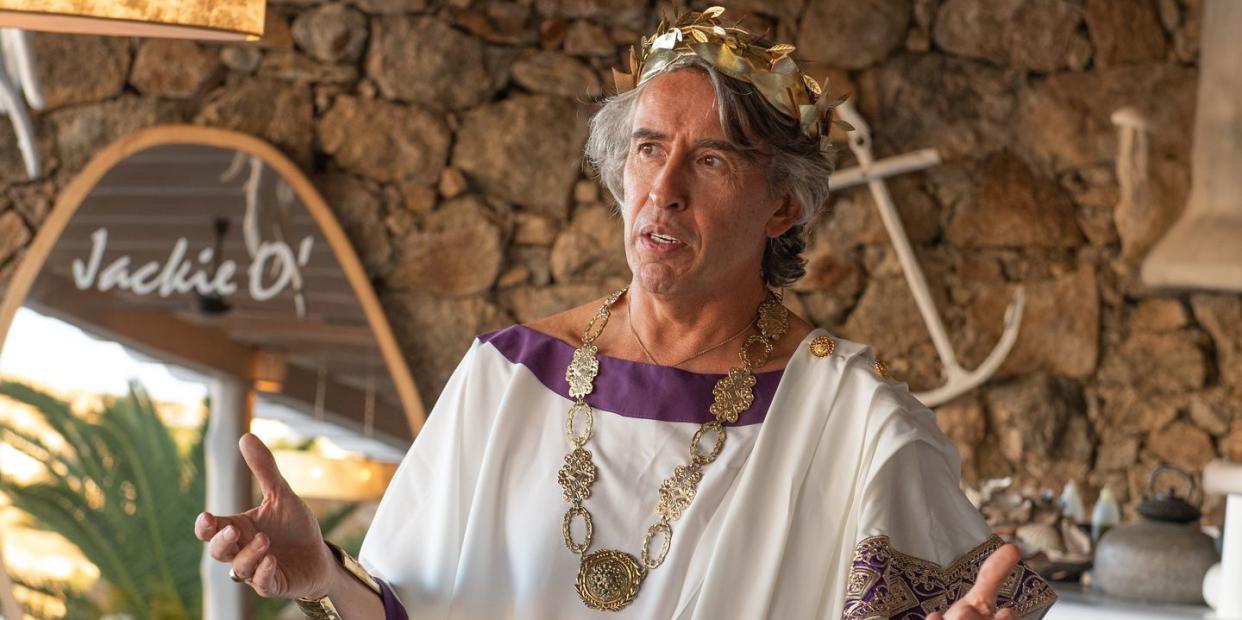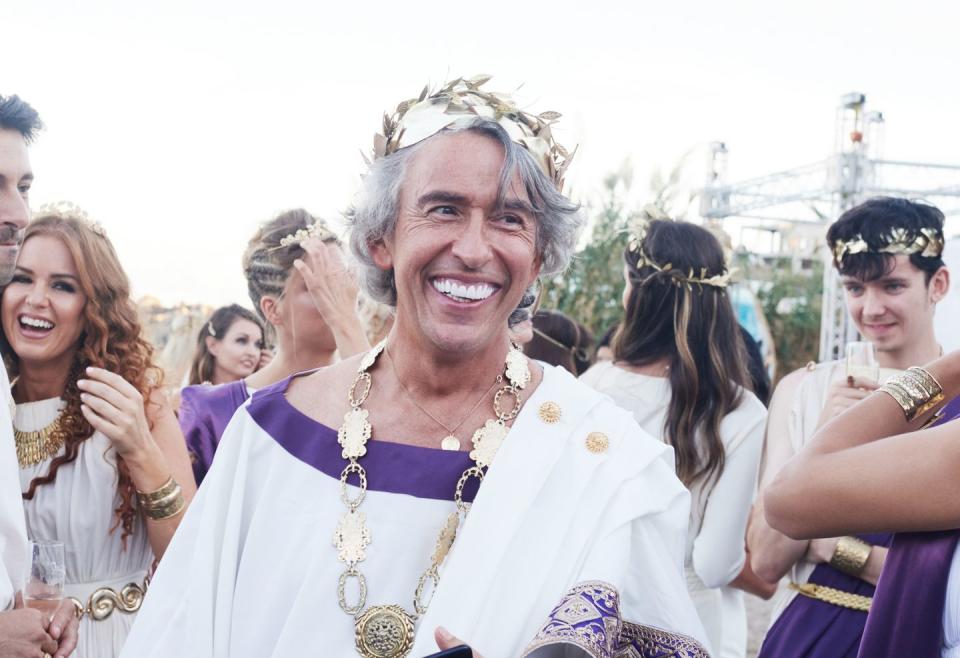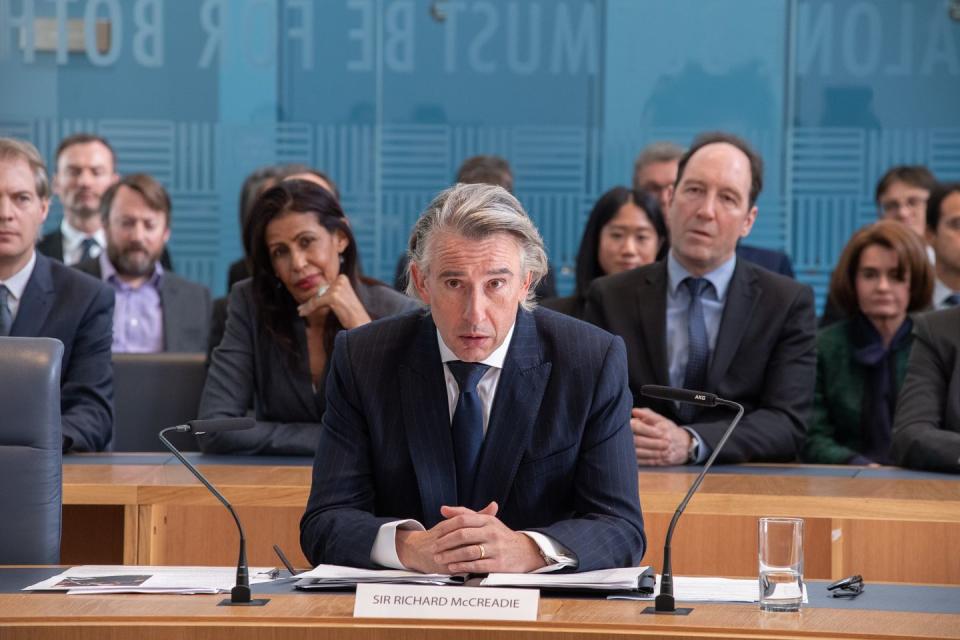Steve Coogan Talks 'Greed', New Alan Partridge, The BBC And Brexit

Steve Coogan was one of the 26.9 million people who settled down to watch the 2012 Olympic opening ceremony while fearing it would be absolutely rubbish. But then it started.
"And it was a refreshing thing: all those those counter-cultural, anti-establishment things that we that we regard as sort of un-British, that are actually endemically British. That was kind of an epiphany when I saw that, because it was staring me in the face the whole time. The idea of being questioning is inherently [British]. The British have very good bullshit detectors in a way that many Americans don't, for example. And that's a really healthy thing about our nation."
In the eight years since, the comedian, writer and actor has been more strident too: campaigning for a People's Vote on Brexit, endorsing Jeremy Corbyn in 2017 and 2019 and tackling the Irish Catholic Church's forcible adoptions in Philomena.
Which brings us to Michael Winterbottom's new film Greed. It's an indictment of exploitative capitalism and poison spread by it around the globe, in which Coogan is fast fashion mogul and all-round bastard Sir Richard McCreadie. He's a creation that takes his particular line of conceited men – from Alan Partridge to The Trip's oversaturated version of himself, via Tony Wilson, Paul Raymond and Martin Sixsmith – to its extreme.
"McCreadie might be the most difficult to sympathise with, to be honest with you. He's sort of unrelentingly awful," Coogan says. "He might sort of occasionally punch up in a rhetorical way but his modus operandi is to punch down, constantly, so that's the hard part to like."
Coogan doesn't really do short answers. In between pouring tea – strong, with barely a vapour trail of milk – he talks animatedly about everything from the BBC ("everything just looks so Mickey Mouse as soon as you put it next to the BBC") to admiring the Tom Hanks school of leading men who have integrity but aren't boring: "To me that's somehow more of an achievement, because dysfunction is always interesting, schadenfreude. We always like to see people fall over; we don't like to see people walk in a very good way."
Is Greed the most straightforwardly angry work you've done so far?
Possibly, possibly. I guess in recent years I've tried to say something, however slight, in everything – if I'm doing Alan Partridge I even try to say stuff in there. It's a way of getting stuff off your chest. I mean, that's why I don't really do social media – I don't need to get stuff off my chest. If something's bugging me, I just put it into whatever it is I'm doing, whether I'm writing or acting it.
Where's the humanity in Rich McCreadie?
Well, I'm not sure there's a great deal of humanity in him to be honest. I mean, insofar as he has, you know, affection for those closest to him which many awful people do, you know? So there is something redemptive. And also it's quite strange, he has a very good relationship with his ex wife, which is oddly winning. But it makes him seem a bit lost – you think what's he doing with this young girl... so that's a strange sort of vulnerability, I suppose. Or weakness. But it is hard to find redemptive quality about him. If you put a gun to my head, I would say that being funny is attractive, even if you're awful, so it does kind of mitigate things. If you make someone laugh, even if they are horrible, then you're making them laugh and when people laugh, you make them feel good. Even if you're not nice, if they're laughing because you said something, then that's already slightly redemptive in a sort of shallow way.

A lot of the things you've spoken out about align in Greed: Thatcherism, tax avoidance, asset-stripping, obsession with fame and the famous, for instance. Were they in there from the start?
Yeah, that's what attracted me to it. To have an effect on the conversation or make people think about stuff, it's always good to do it through some form some art form. It's more persuasive. It might not be conclusively persuasive. But it makes people think a little about things on a more profound level. And I don't think people win arguments by having intellectual discourse. I can present loads of evidence and statistical evidence, you can do it like a formal debate, but people don't have Damascene conversions after a debate. But they might think differently, or think more, or challenge themselves. It's just important for everybody to consider the possibility that they may be wrong about anything. That's healthy. And I think art does that best. If you connect with people, you make people cry, you make people laugh, you're already well on the way to making them think about things slightly differently. Which is why the rise of populism as occurred, because people respond to stories more than they do to information. And that can be a good thing, or it could be a bad thing.
Why use comedy?
It's immediately accessible. Someone said to me that it's because it's crude, but you can be sophisticated and still be immediately accessible by doing a funny voice. I remember when I started out in this business, I had a small part in a Paul Greengrass film [Resurrected] – 32 years ago. A very small part, and Paul Greengrass was just starting out, but I went in and met him for the first time and he said, 'Someone says you do impersonations?' Yeah. 'OK, do a few.' So I did a few impersonations. Within, like, 60 seconds, he was impressed: 'Oh my god, they're really good!'. So what that meant is that in a very short space of time I was able to to pique his interest. You reel someone in a bit by doing something which some people think is funny. Instead of this ADHD social media world, you can very quickly get someone's attention by just making them laugh fairly quickly with a joke. When you start, you do this stuff intuitively, and as the years roll by you go, 'Oh, this is pretty interesting, this thing I do called comedy, because you can talk about stuff that other people can't talk about.'
When was the last time comedy changed your mind about something?
Stewart Lee does that, for me. He challenges me and makes me feel uncomfortable about my smug middle class liberalism. Because he pulls no punches even in that regard. He's made me laugh at things that I don't like about myself, and made me think I need to do better.

How has being from the North shaped your sense of humour?
Well, the cloud cover in the north means that you very rarely see a shadow and that definitely engenders a pallor of circumspection. Which is creatively quite good, and loads of great bands have come out of Manchester and it's definitely to do with the damp and the clouds. There's some something in the air, definitely. But also when I was growing up watching TV, the BBC curated stuff brilliantly, I thought. I always would defend the BBC as being a way to reach [people]. The thing about the BBC was, it wasn't reflecting a user profile. In some ways, and it's a very unfashionable view, it was saying, 'you need to eat this, but you also need to eat this stuff that you don't want to eat'. You've got to eat your greens, because otherwise you'll get scurvy, right? If you just eat sweets and chicken and don't eat any vitamin C, you will get scurvy. So the BBC had that sort of paternalistic thing of saying, 'Here's something funny, entertaining you. And you need to maybe watch this documentary too, because this is quite interesting and you could learn something here.' The BBC was kind of a glue.

Do you worry for its future?
Yeah. I think it's like the NHS – it gets it in the neck right and left, and it's far from perfect. But I think sometimes there are ideological problems against it because it's seen as some last vestige of a social experiment that is successful, like the NHS. It's irrefutably valued and demonstrably works but it doesn't fit into the free market view of the world and so it's seen as a kind of a fly in the ointment, an annoyance, by people ideologically. But I think at its best, the thing I said about it being a glue, it still does that. It feels like a port of call. It feels like a touchstone.
What's next for Alan Partridge?
We've just done a podcast. That's out next month, 18 episodes, that's all done. I'm excited about it, it's different: very personal, myopic. There's that, and then we're going to do another This Time and eventually we'll do a documentary series. Quite what form that takes I don't know, but there'll be documentary inserts in [This Time] and we might be a bit more adventurous with that. We always have to take a breather between each Alan thing, even though it's a gift that keeps on giving. It's kind of so [much] part of me now, I wouldn't not want to do it, but I like the balance of doing other things. I'm doing a movie this year – we're shooting a movie in June and July that I wrote, about the woman who found the body of Richard III in a car park. I can't tell you too much more about it, but that's definitely happening, and a bunch of other stuff that's in development. I'm writing a series with Sarah Solemani about sexual politics [Chivalry, for Channel 4]. So I'm doing stuff I'm really interested in, but I'll always come back and do more Alan.
It sounds like you've got quite a good relationship with him these days.
Yeah, I do. It's the fact that was able to do other stuff. I suppose the thing that broke the back of it was Philomena, which was the first time I ever tried to write a drama and it was like, 'Oh, good, I can do this now as well'. So I pursued that and managed to sort of shake loose from him. And that made it more likely I'd go, 'Oh, good, I don't have to do him. So now I want to do him, because I don't have to'. It liberates you and enables you to enjoy it. I don't want to not do Alan anymore.
As a supporter of the People's Vote campaign, how are you feeling about Brexit actually happening?
I'm glad that we've stopped talking about it. That's the best thing I'll say about it. Look, half the country felt the way it did. I think if it had gone the other way, there was an anger and a lack of nuance on the other part of that debate which would be less forgiving. I think Remainers, by their nature, are more nuanced people. And therefore the result in some ways will be less fractious for that reason. Remainers are more likely to say 'let bygones be bygones'. Brexiteers are more likely to start burning things, had it gone the other way. The most important is preserving the rights of workers and looking after those at the bottom of society, right at the bottom of the food chain. If you can do that, then that's what matters, to me. If it evolves into something differently from right wing populism, then I'm OK with it, I guess. You have to be pragmatic about it. Taking your ball in or hoping the world goes to hell in a handcart, that's the worst kind of liberal elitism: 'All the poor working class people who voted for [Brexit], I hope they all die in disease and pestilence.' That attitude is not good, however tempting it might be the night after something goes the wrong way. You have to walk towards the light.
Greed is out in cinemas from today.
Like this article? Sign up to our newsletter to get more delivered straight to your inbox
You Might Also Like

